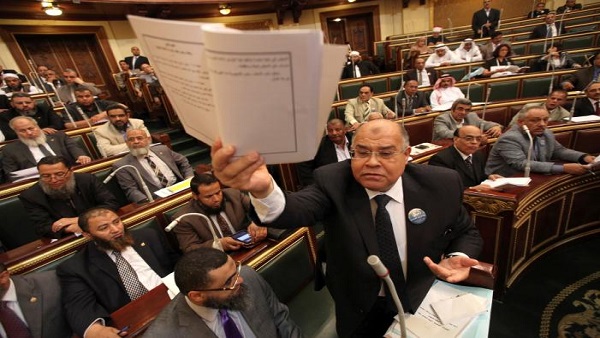A member of the upper house of the parliament talks during a session in Cairo, Egypt June 10, 2013. Photo Crediy: REUTERS
An Egyptian bill regulating non-governmental organizations is so restrictive it effectively bans human rights work and makes it harder for charities to operate, activists and development workers say.
The bill, passed by parliament last week but subject to a final vote, restricts NGO activity to developmental and social work and introduces jail terms of up to five years for non- compliance.
Egyptian rights activists say they face the worst crackdown in their history under general-turned-president Abdel Fattah al-Sisi, who they accuse of erasing freedoms won in a 2011 uprising that ended Hosni Mubarak’s 30-year rule.
The government had been working for years on a new law regulating NGOs, which human rights groups feared would be more restrictive than Mubarak-era rules.
But the bill that was drafted and rushed through by MPs last week is more draconian than anything the government had considered, introducing oversight into the funding and work of charitable and development groups with no political links.
“It is just easier for the government and for us to issue a law banning NGOs instead of beating around the bush with this bill,” said Mohamed Zaree, Egypt program director at the Cairo Institute for Human Rights Studies.
Social Solidarity Minister Ghada Waly who oversees the NGO sector did not respond to emailed requests for comment.
Lawmakers who drafted the bill say is necessary to protect national security. The government has long accused human rights groups of taking foreign funds to sow chaos and several are facing investigation over their funding.
But charities say the bill restricts them at a time when subsidy cuts and tax increases have made it harder for Egyptians to make ends meet.
TREATED “LIKE THIEVES”
Charities have long played an important role in feeding, clothing and providing healthcare and education in a country where millions live on less than $2 a day.
But a sharp drop in the value of the currency and reforms promised by the government to clinch a $12 billion IMF loan mean their role is more critical than ever.
Marwa El Daly, whose Waqfeyat al-Maadi Community Foundation offers training and toolboxes for jobless young people, says the bill is damaging.
“The more you restrict NGO work and treat workers like thieves, the less inclined people will be to do it,” said Daly. “Bills like these destroy the public’s trust and make it seem like the state is protecting the people from NGOs.”
Provisions obliging NGOs to inform authorities before collecting and spending donations will bog them down and stifle their work, NGO workers say.
Under the new bill, donations exceeding 10,000 pounds ($570) must be preapproved. If no approval is granted within 60 days the request is automatically denied. Failure to inform authorities can result in jail terms of up to five years and fines of up to 1 million Egyptian pounds ($57,000).
The bill also gives the government power over deciding who can establish an NGO and for what purpose.
It obliges groups to stick to the “state’s development plan”, severely restricting the work they can do in areas the government does not consider a priority.
NGO chiefs who move their group’s headquarters without informing the authorities can go to jail for a year.
The bill also bans domestic and foreign groups from engaging in political activities or anything that harms national security, public order, public morals or public health — a means, say human rights groups, to stifle dissent.
“DEVASTATING” CIVIL SOCIETY
Talaat Abdelqawi, head of the official Federation of NGOs, said the bill is a matter of security though he would prefer to see the jail terms dropped.
“We care about the security and safety of citizens and stopping infractions either from suspect funding or foreign organizations attacking the country and the regime,” he said.
Under the new bill, fieldwork and polls conducted without prior state approval can land researchers in jail, as can collaborating with international institutions such as the United Nations.
The United Nations says the bill effectively makes civil society a branch of government.
“This bill proposes perhaps the worst restrictions on fundamental freedoms in Egypt since the 2011 uprisings,” UN expert Maina Kiai said in a statement.
“It aims to destroy Egypt’s foundation for peaceful, civic engagement at its very roots. If it becomes law, it would devastate civil society not only in the short term, but possibly for generations to come.”
Source: Reuters


